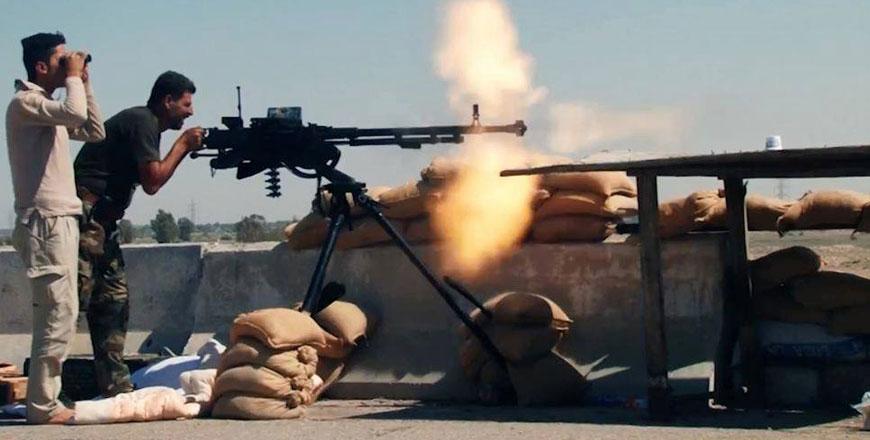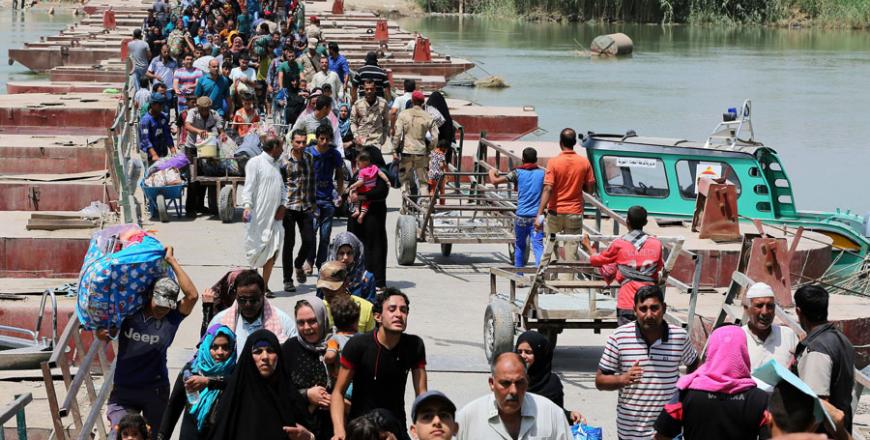You are here
Slow gains in Anbar set pace for Iraq’s anti-Daesh offensive
By Reuters - Aug 06,2015 - Last updated at Aug 06,2015
BAGHDAD/BEIRUT — After only modest gains in the first few weeks of their drive to retake Anbar province, Iraqi government forces have given up hopes of swift advances against Daesh militants.
The campaign, launched after the provincial capital Ramadi fell in May, initially aimed at recapturing the city quickly but then shifted east to break the militants' 19-month grip on the city of Fallujah and secure supply lines from Baghdad.
Confronted with Anbar's sprawling terrain as well as the reality of a weakened fighting force, the sensitivity of sending Shiite militias into Sunni strongholds, and political tensions including an Iranian-Western fight for influence, Baghdad and its allies have had to modify expectations.
Fighting has progressed fitfully on both fronts, with Iraqi forces backed by US-led coalition air strikes dismantling an insurgent command base in Ramadi last week, while Shiite Muslim militias spearhead efforts to disrupt militant supply routes to Fallujah.
Iraqi and US sources engaged in the campaign say the slow, deliberate approach aims to engage the Daesh terror group in multiple locations — a tactic the group itself has deployed effectively to weaken enemy ranks — by tightening cordons around Ramadi and Falluja and controlling their rural belts to prevent reinfiltration from northern strongholds.
“All the operations in the area are meant to gnaw at and dismember Daesh in two directions: cutting off supply lines and logistics between Anbar and Mosul from one side and from Anbar and Salahuddin on the other,” said Karim Al Nuri, spokesman for the Badr Organisation, an Iranian-backed militia.
Many of the towns and cities in Anbar, the Sunni Muslim heartland extending hundreds of kilometres west of Baghdad and up to the Syrian border, are Daesh strongholds.
The wide-open territory creates a challenge for Iraq’s thinning security forces, worn down by defeats in Ramadi and the northern city of Mosul as well as gruelling battles elsewhere, despite a US programme to train Sunni tribal fighters.
“It’s a space-to-forces ratio problem. They don’t have enough forces to hold areas,” said Michael Knights, an Iraq expert at the Washington Institute think-tank.
The fall of Ramadi nearly three months ago was the biggest defeat for Iraq’s weak central government in nearly a year. It dampened Baghdad’s hopes of quickly routing the militants from the country’s north and west following earlier victories in the eastern province of Diyala and Saddam Hussein’s home town of Tikrit.
Recapturing Anbar, close to the capital and holy Shiite shrines in the south, is a strategic prerequisite for advancing towards Mosul, from where Daesh aims to carve out a caliphate in large parts of Syria and Iraq.
Awkward alliance
Prime Minister Haider Al Abadi, a moderate Shiite Islamist, initially sought to keep Shi’ite militias on the sidelines in Anbar for fear of inflaming sectarian sensitivities, but Ramadi’s fall undermined his position.
The militias, organised under a government umbrella called the Hashid Shaabi, have said they will take the lead on the ground in Falluja, not the army.
The Anbar offensive tests the effectiveness of a thorny arrangement that puts the US-led coalition, however reluctantly, on the same side of a fight as Iranian-backed militias in support of Iraqi forces.
A similar scenario played out in March in Tikrit, though US officials said the militias had retreated before air support began.
With many thousands of militia fighters now operating in Anbar and the high level of coalition air strikes in the region, the chance for overlap is greater.
“It’s getting more coordinated than it was about two to three months ago. It has to be done through the Iraqi membrane because these groups cannot interact with the US or vice versa,” said Knights, the Iraq expert.
The United States last month played down the likelihood that Baghdad would invite Shiite militias to take part in the Ramadi offensive.
Sources familiar with operational planning said Baghdad still had no intention to deploy militias, although one of them suggested that might change if the army offensive struggles.
For now US-led air strikes, which surpassed 100 in the first three weeks of the Anbar campaign, have focused on “shaping operations” around Ramadi to ready for a direct assault led by regular Iraqi forces.
“The clearing stage is next, and it promises to test the mettle of the ISF [Iraqi Security Forces],” said Marine Corps Brigadier General Kevin Killea, chief of staff for the US-led coalition.
Sources familiar with the planning say clearing operations were expected to start in the coming weeks. Ground advances have been delayed by explosives planted by Daesh along roads and in buildings.
Underlying tensions
Baghdad’s strategy in Anbar is complicated further by domestic politics.
International support against Daesh could help Abadi counter the power of Iranian-backed parties, which are pushing for a greater role for Shiite militias in the Sunni stronghold.
Qais Al Khazali, leader of one of the fiercest militia, condemned Washington in a Reuters interview last month for pressuring Abadi to keep militia fighters out of Fallujah and far from Ramadi.
“It’s an issue linked to serious American support that Abadi is desperately seeking,” a politician close to the prime minister told Reuters separately. “He knows very well if he wants the Americans to stand up, then he should tell the Hashid [Shaabi] to sit down.”
Abadi, once seen as the best hope for healing sectarian divisions, risks alienating Shiite backers if he attempts to sideline their militias in favour of government troops. Some of them don’t want him to claim success for a victory in Anbar, said Renad Mansour, an Iraq scholar at the Carnegie Middle East Center.
At the same time Abadi faces unrest from Sunnis who fear resorting to the militias will further marginalise them and weaken their position in a fragile political system.
Military victories alone will fail to eliminate Daesh after it took root in communities that have long complained of discrimination and sectarian violence in majority-Shiite Iraq, said Mansour.
“All the problems are still there and nothing’s been done really to address these problems.”
Related Articles
ERBIL, Iraq/WASHINGTON — Iraqi Shiite militia fighters are tightening a noose around the Daesh-held city of Fallujah west of Baghdad a
BAGHDAD — Iraqi forces may face a big battle near Baghdad before they can try to retake the Daesh stronghold of Mosul: Fallujah, a long-time
Iraqi forces said they fought off an overnight attack by Daesh militants near the city of Ramadi, which the insurgents overran at the weekend in the most significant setback for the government in a year.

















